2014北京朝阳区高三期末英语试题答案
北京市朝阳区2014届高三英语第一次综合练习(朝阳一模)新人教版
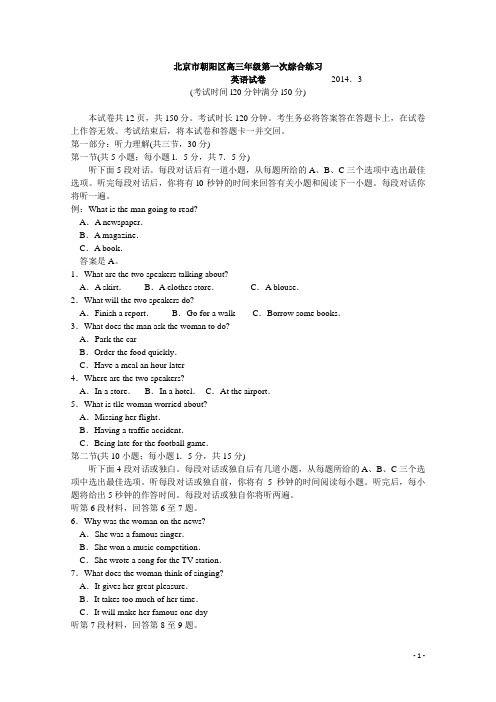
北京市朝阳区高三年级第一次综合练习英语试卷2014.3(考试时间l20分钟满分l50分)本试卷共12页,共150分。
考试时长120分钟。
考生务必将答案答在答题卡上,在试卷上作答无效。
考试结束后,将本试卷和答题卡一并交回。
第一部分:听力理解(共三节,30分)第一节(共5小题;每小题l.5分,共7.5分)听下面5段对话。
每段对话后有一道小题,从每题所给的A、B、C三个选项中选出最佳选项。
听完每段对话后,你将有l0秒钟的时间来回答有关小题和阅读下一小题。
每段对话你将听一遍。
例:What is the man going to read?A.A newspaper.B.A magazine.C.A book.答案是A。
1.What are the two speakers talking about?A.A skirt.B.A clothes store.C.A blouse.2.What will the two speakers do?A.Finish a report.B.Go for a walk C.Borrow some books.3.What does the man ask the woman to do?A.Park the carB.Order the food quickly.C.Have a meal an hour later4.Where are the two speakers?A.In a store.B.In a hotel.C.At the airport.5.What is tlle woman worried about?A.Missing her flight.B.Having a traffic accident.C.Being late for the football game.第二节(共10小题;每小题l.5分,共15分)听下面4段对话或独白。
每段对话或独自后有几道小题,从每题所给的A、B、C三个选项中选出最佳选项。
北京市朝阳区2014届高三第一学期期末练习英语试题及答案(WORD精校版)
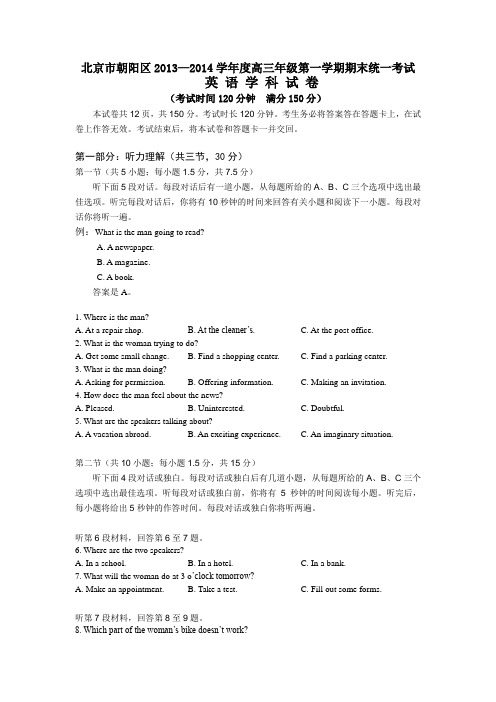
北京市朝阳区2013—2014学年度高三年级第一学期期末统一考试英语学科试卷(考试时间120分钟满分150分)本试卷共12页,共150分。
考试时长120分钟。
考生务必将答案答在答题卡上,在试卷上作答无效。
考试结束后,将本试卷和答题卡一并交回。
第一部分:听力理解(共三节,30分)第一节(共5小题;每小题1.5分,共7.5分)听下面5段对话。
每段对话后有一道小题,从每题所给的A、B、C三个选项中选出最佳选项。
听完每段对话后,你将有10秒钟的时间来回答有关小题和阅读下一小题。
每段对话你将听一遍。
例:What is the man going to read?A. A newspaper.B. A magazine.C. A book.答案是A。
1. Where is the man?A. At a repair shop.B. At the cleaner’s.C. At the post office.2. What is the woman trying to do?A. Get some small change.B. Find a shopping center.C. Find a parking center.3. What is the man doing?A. Asking for permission.B. Offering information.C. Making an invitation.4. How does the man feel about the news?A. Pleased.B. Uninterested.C. Doubtful.5. What are the speakers talking about?A. A vacation abroad.B. An exciting experience.C. An imaginary situation.第二节(共10小题;每小题1.5分,共15分)听下面4段对话或独白。
2014北京市朝阳区高三(一模)英语

2014北京市朝阳区高三(一模)英语(考试时间l20分钟满分l50分)第一节单项填空(共15小题;每小题l分,共15分)21.In China, you vote when you are 18.A.must B.might C.can D.would22.I've been away for only three years, I can hardly recognize my hometown.A.so B.or C.for D.yet23.This article is well written because special attention to the choice of words.A.has paid B.has been paid C.had paid D.had been paid24.They always give the vacant seat to comes first.A.anyone B.whom C.whomever D.whoever25.In some countries,friends kiss both cheeks when they say goodbye.A.on B.in C.at D.of26.It is hard to imagine makes a top—level athlete.A.which B.how C.that D.what27.The movie Gravity won seven awards at the Oscar night, was beyond the director's wildest dream. A.which B.that C.where D.what28.----Did he get the job finally?----Though he well before the job interview,he failed to answer some important questions.A.was preparing B.would prepare C.had prepared D.has prepared29.When about one of the biggest concerns today,many citizens mentioned the sharp rise in housing price.A.asking B.to ask C.asked D.having asked30. Time, the teacher had us do half of the exercises in class and complete the other half for our homework.A.To save B.Save C.Saving D.Having saved31.Remember me to your parents when you them.A.are calling B.call C.will call D.have called32.----What’s t hat noise? ---- There’s a truck stopping outside.It’s someone something. A.deliver B.to deliver C.delivering D.delivered33.Quietness seems impossible everyone takes their seats and begins to write.A.until B.after C.for D.once34.---How long have you been here,Susan? ---Only about five minutes.Alisa here with me.A.walks B.walked C.has walked D.had walked35.I didn’t know your mobile phone number;otherwise I you the moment I got to Canada.A.would ring B.would have rung C.had rung D.rang第二节完形填空(共20小题;每小题l.5分,共30分)Wallet BackThis is a story about a learning experience that had a big effect on the way I live my life.The36 in the story did not give me tests or even grade me on my work.I was taught by one of the most effective37 of teaching,one that only people with lots of love can do.“My wallet! Where is it?” were my first words 38 I found my wallet was missing.I 39 my memory for a few good seconds, then realized that I had left my precious wallet in the library’s public 40 ! Because the library was now 41, I had to wait until the next morning to look for it.When I got there the next day, all I found was a clean restroom.This was tlle first time I could remember ever 42 tosee a clean restroom.As I walked out,I looked at myself in the mirror and shook my head at the 43 fool in front of me.I politely 44 the librarian at the front desk and asked her if a wallet had been found in the restroom yesterday.“N o.”T hat was that.I walked off with a sense of 45.I 46 what I would do if I had found a wallet with sixty dollars,a phone card and other irreplaceable47 things.Finally,I 48 accepted the fact that my wallet was gone.A week later,I received a 49 in the mail.It was my wallet! And most 50 ,nothing was missing! But there was a letter folded up in one of the wallet pocket that had not been there before.I slowly unfolded the letter,which 51 something like this:When we continue to help people around,we will live in a larger and more rewarding world.This person didn’t even leave a retum address.So I couldn’t 52 whoever it was.But from that day on,I 53 myself that l will follow this 54 and help others and make them as 55 as I was when I opened that parcel!36.A.1eader B.writer C.teacher D.scholar37.A.aids B.systems C.materials D.methods38.A.once B.when C.before D.since39.A.searched B.improved C.developed D.reeorded40.A.canteen B.lounge C.restroom D.showroom41.A.closed B.deserted C.crowded D.occupied42.A.hoping B.hating C.refusing D.preferring43.A.grateful B.curious C.forgetful D.nervous44.A.approached B.interviewed C.identified D.reminded45.A.safety B.forgiveness C.satisfaction D.disappointment46.A.described B.wondered C.discovered D.expressed47.A.personal B.strange C.surprising D.reasonable48.A.gladly B.naturally C.willingly D.painfully49.A.1etter B.note C.package D.suitcase50.A.sincerely B.amazingly C.honestly D.obviously51.A.read B.printed C.explained D.wrote52.A.owe B.thank C.admire D.inspire53.A.supported B.suggested C.improved D.promised54.A.plan B.course C.regulation D.example55.A.shocked B.cautious C.delighted D.optimistic第三部分:阅读理解(共两节。
2014年北京朝阳高三二模英语试题及答案

2014年北京朝阳高三二模英语试题及答案北京朝阳区高三年级第二次综合练习英语试卷2014.5第一部分:听力理解(共三节,30分)第一节(共5小题;每小题1.5分,共7.5分)听下面5段对话。
每段对话后有一道小题,从每题所给的A、B、C三个选项中选出最佳选项。
听完每段对话后,你将有10秒钟的时间来回答有关小题和阅读下一小题。
每段对话你将听一遍。
例: What is the man going to read?A. A. newspaper.B. A magazine.C. A book.答案是A。
1. What will the woman probably do now?A. Go for a trip.B. Board the plane.C. Take a rest.2. What is the man doing?A. Offering help.B. Asking for advice.C. Making an appointment.3. What would the woman like to have now?A. A. glass of wine.B. Some more chicken.C. Nothing else.4. Where are the two speakers talking?A. At home.B. On the phone.C. At the restaurant.5. What is the probable relationship between the two speakers?A. Waiter and customer.B. Teacher and studentC. Boy and girl friends.第二节(共10小题;每小题1.5分,共15分)听下面4段对话或独白。
每段对话或独白后有几道小题,从每题所给的A、B、C三个选项中选出最佳选项。
2014.1朝阳高三期末英语试题

北京市朝阳区2013—2014学年度高三年级第一学期期末统一考试英语学科试卷第二部分:知识运用(共两节, 45分)第一节单项填空(共15小题;每小题1分, 共15分)21. Those _____ have six or more close friends are described as “very happy”.A. whoB. whoseC. whichD. when22. She didn’t know _____ she could express her ideas clearly when she was invited to speak at the meeting.A. howB. whereC. whyD. what23. —Your e-mail address again? I _____ quite catch it.—It’s tracy@.A. don’tB. didn’tC. won’tD. wouldn’t24. You know, I _____ for a job for three months, but I haven’t had any luck.A. have been lookingB. have lookedC. had been lookingD. had looked25. They regard it as their duty _____ the best service to the customers.A. providedB. providingC. provideD. to provide26. _____ how to deal with the trouble with the car, Lily had to ask her friend for help.A. Not knowB. Not knownC. Not knowingD. Not to know27. Since there are five managers giving reports, the meeting _____ for at least two hours.A. lastsB. lastedC. will lastD. would last28. Many things _____ impossible in the past have already come true today.A. consideringB. to considerC. being consideredD. considered29. —The football match was amazing!—Really? How I wish I _____ to the stadium with you yesterday!A. wentB. had goneC. could goD. would go30. What Alex really means is _____ he disagrees with us.A. howB. whyC. whatD. that31. —Why did you buy two pairs of shoes?—It was so hard to choose which was the better, so I took them _____.A. allB. bothC. eitherD. each32. All the preparations for the task _____, and we’re ready to start.A. have completedB. have been completedC. had completedD. had been completed33. —Are there still any English dictionaries in the school library?—I hear there _____ be a few copies left.A. mayB. mustC. canD. should34. _____ you are all back, we’d better start our class right away.A. Even thoughB. If onlyC. Now thatD. In case35. The weather at this time is really too warm _____ January in Beijing.A. inB. onC. duringD. for第二节完形填空(共20小题;每小题1.5分,共30分)More Than One Way to the SquareWe were standing at the top of a church tower. My father had __36__ me to this spot in a small town not far from our home. I wondered __37__.“Look down, Elsa,” Father said. I gathered all my __38__ and looked down. I saw the square in the centre of the village. And I saw the crisscross (十字形) of twisting, turning streets leading to the __39__.“See, my dear,” Father said gently. “There is more than one way to the square. Life is like that. If you can’t get to the place where you want to go __40__ one road, try another.”Now I understood why I was there. Earlier that day I had __41__ my mother to do something about the awful school lunches. But she __42__ because she could not believe the lunches were as __43__ as I said.When I turned to Father, he would not help. Instead, he brought me to this high tower to give me a __44__—the value of an open, searching mind. By the time we reached home, I had a __45__.At school the next day, I __46__ poured my lunch soup into a bottle and brought it home. Then I talked the cook into serving it to Mother at dinner. Everything went on smoothly. She swallowed one __47__ and spat it out. Quickly I told her what I had done, and Mother stated __48__ that she would take up the matter of lunches at school the next day!In the years that followed I often remembered what Father taught me. I began to work as a fashion (时装) designer two years ago. I was busy getting ready to show my winter fashions. But just 13 days before the presentation the sewing girls all stopped working. I was as __49__ as my models. “We’ll never make it,” one of them cried.Accept the failure? __50__ use wisdom to find another road to my goal? Then a great idea flashed through my mind—why not __51__ the clothes unfinished?And, exactly 13 days later, our showing turned out to be so __52__ that it was a great success. Our different showing caught the __53__ of the public, and orders for the clothes __54__ in.Father’s wise words had __55__ me once again, “There is always more than one way to the square.”36. A. sent B. brought C. directed D. welcomed37. A. who B. how C. what D. why38. A. thoughts B. strength C. courage D. spirits39. A. square B. tower C. town D. village40. A. in B. on C. by D. across41. A. persuaded B. begged C. encouraged D. ordered42. A. failed B. agreed C. promised D. refused43. A. bad B. expensive C. delicious D. hot44. A. lesson B. chance C. shock D. ride45. A. goal B. result C. plan D. choice46. A. skillfully B. actively C. carelessly D. secretly47. A. cupful B. spoonful C. handful D. bagful48. A. thoughtfully B. simply C. firmly D. repeatedly49. A. positve B. cheerful C. calm D. hopeless50. A. Or B. And C. But D. So51. A. show B. buy C. change D. sell52. A. famous B. poor C. unusual D. ordinary53. A. notice B. attention C. desire D. impression54. A. turned B. handed C. stepped D. poured55. A. suggested B. guided C. corrected D. defeated第三部分:阅读理解(共两节,40分)第一节(共15小题;每小题2分,共30分)AWikipedia: The Online Know-It-AllIf you want to find out a piece of information about anything, the best place to search for it is Wikipedia. The name “Wikipedia” is from the Hawaiian word wiki, meaning “quick”. This online encyclopedia (百科全书) is written by thousands of people around the world. Anyone with Internet access can write, add or make changes to Wikipedia articles if he or she finds it incorrect or not well written. In this way, people who know a lot about a certain subject can write about it even if they are not university professors. But contributions cannot damage Wikipedia because many experienced editors are watching pages and techies (技术专家) can write editing programs to keep track of or correct bad edits. Where there are disagreements on how to present facts, editors work together to arrive at an article that fairly represents current expert opinion on the subject.Wikipedia is quite different from paper-based reference sources in important ways. Unlike printed encyclopedias, it is continually created and updated, with articles on historic events appearing within minutes, rather than months or years.What’s more, Wikipedia includes articles written in about 285 languages. This fact makes it one of t he few websites on the Internet that are truly international. It was started in 2001 by Larry Sanger and Jimmy Wales, as a free online English-language encyclopedia project. Since its creation, it has grown rapidly into one of the largest reference websites, attracting nearly 500 million unique visitors monthly. There are more than 77,000 active contributors working on more than 22,000,000 articles in different languages. As of today, there are 4,396,866 articles in English.So, if you are looking for some information, why not try Wikipedia? It’s free, multilingual,and informative.56. According to the passage, what is Wikipedia?A. A free website encyclopedia.B. A computer game.C. A free encyclopedia in book form.D. An online university.57. From the passage we know that ______.A. Wikipedia catches a wide audienceB. Wikipedia only charges users a small feeC. incorrect editions might do great harm to WikipediaD. it will take long to update the information on Wikipedia58. Where can we probably read the passage?A. In a story book.B. In a research report.C. In a science magazine.D. In a travel brochure.BSixteen-year-old Karlos Dearman’s future is looking much brighter than he might previously have imagined. “I love bikes, but I’ve never thought I’d end up with working with them,” he says. “This program has changed my life.”Karlos is learning to refurbish (翻新) old bicycles in the workshop (车间) of ReCycle Bikes, an independent non-profit bike project in Sheffield. It provides training chances for young people aged 14 to 16 with the help of the local government, particularly those struggling in mainstream education or rejected from school.“It’s about engaging young people with education and youth training by teaching them work and life skills,” explains Des Pearce, workshop training manager. “These young people have so much potential, but often don’t realize it.”Founded in 2001, ReCycle Bikes repairs bicycles donated by the public, which are sold for £20 after refurbished. Abandoned bikes supplied by the government make sure a steady flow of bikes, but a recently formed partnership with Sheffield University should improve the further development.“The student population presents a large and ready market,” says Pearce. “So we approached the university last year and offered to host bike sales on the campus (校园) . They thought it was a great idea, and agreed to provide us with more support. This means we can train young people to repair extra 500 bikes ove r three years.”Having set up ReCycle Bikes on his own, Pearce now has the staff and resources to track the profession development of those who have passed through his workshop. “But we are planning exit interviews with the young people to make sure what they plan to do, and these will allow us to check on their progre ss,” s ays Pearce.That most of the teenagers enjoy the work is, according to Pearce, easily explained. “Most kids have ridden a bike and know how to oil a chain or mend a flat tyre. As low-cost transport, cycling gives the young and old a sense of freedom and independence, and the effect on their well-being is big. Add to that a growing concern for the environment, and it’s no surprise that bike sales are on the increase.”59. From the passage, we know ReCycle Bikes ______.A. is a popular brand of bikesB. provides training chances for young peopleC. is a training project offered by the governmentD. aims at making money by selling refurbished bicycles60. How did ReCycle Bikes run at the beginning?A. By working together with Sheffield University.B. By selling bicycles supplied by the government.C. By getting money from teenagers aged between 14 and 16.D. By repairing bicycles donated by the public and selling them.61. ReCycle Bikes has formed a partnership with Sheffield University because _____.A. students at Sheffield University can be their potential customersB. Sheffield University donates a lot of money to ReCycle BikesC. teenagers at ReCycle Bikes can study at Sheffield UniversityD. Sheffield University offers to host bike sales on the campus62. According to Pearce, why do most of the teenagers enjoy the work?A. They’d like to change their lives.B. They want to learn how to repair bikes.C. They don’t have e nough money to buy cars.D. They are familiar with bikes and interested in them.CMen are spending more and more time in the kitchen encouraged by celebrity (名人) chefs like Gordon Ramsay and Jamie Oliver, according to a report from Oxford University.The effect of the celebrity role models, who have given cooking a more manly picture, has combined with a more general drive towards sexual equality and men now spend more than twice the amount of time preparing meals than they did in 1961.According to the research by Prof. Jonatahn Gershuny, who runs the Centre for Time Research at Oxford, men now spend more than half an hour a day cooking, up from just 12 minutes a day in 1961.Prof. Gershuny said, “The man in the kitchen is part of a much wider social trend. There has been 40 years of sexual equality, but there is another 40 years probably to come.”Women, who a generation ago spent nearly two hours a day cooking, now spend just one hour and sevenminutes—a great fall, but they still spend far more time in the kitchen than men.Some experts have named these men in aprons as “Gastrosexuals (men using cooking skills to impress friends)”, who have been inspired to pick up a kitchen knife by the success of Ramsay, Oliver as well as other male celebrity chefs such as Hugh Fearnley-Whittingstall, Marco Pierre White and Keith Floyd.“I was married in 1974. When my father came to visit me a few weeks later, I was wearing an apron when I opened the door. He laughed,” said Prof. Gershuny. “That would never happen now.”Two-thirds of adults say that they come together to share at least three times a week, even if it is not necessarily around a kitchen or dining room table. Prof. Gershuny pointed out that the family meal was now rarely eaten by all of its members around a table—with many “family meals” in fact taken on the sofa in the sitting room, and shared by family members. “The family meal has changed a lot, and f ew of us eat—as I did when I was a child—at least two meals a day together as a family. But it has survived in a different format.”63. What is one reason behind the trend that men spend more time cooking than before?A. The improvement of cooks’ status.B. The influence of popular female chefs.C. The change of female’s view on cooking.D. The development of sexual equality campaign.64. What does the author think about the time men and women spend on cooking?A. Men spend more time cooking than women nowadays.B. Women spend much less time on cooking than before.C. It will take 40 years before men spend more time at the stove than women.D. There is a sharp decline in the time men spend on cooking compared with 1961.65. How did Prof. Gershuny see the family meal according to the passage?A. It has become a thing of the past.B. It is very different from what it used to be.C. It shouldn’t be advocated in modern times.D. It is beneficial to the stability of the family.66. Which is the best title for the passage?A. The Changes of Family MealsB. Equality between Men and WomenC. Cooking into a New Trend for MenD. Cooking—a Thing of the Past for WomenDTeaching is more than leadership. Some of the teacher’s time and effort is directed t oward instruction, some toward evaluation. But it is the teacher as a group leader who creates an effective organizational structure (结构) and good working environment so that instruction and evaluation activities can take place. A group that is totally disorganized, unclear about its goals, or constantly fighting among its members will not be a good learning group. The leadership pattern includes helping to form and maintain a positive learning environment so that instruction and evaluation activities can take place.On the first day of class, the teacher faces a room filled with individuals (个体). Perhaps a few closely united groups and friendships already exist. But there is no sense of group unity, no set of rules for conduct in the group, no feeling of belonging. If teachers are successful leaders, they will help students develop a system of relationships that encourages working together.Standards and rules must be set to keep order, make sure of justice and protect individual rights, but do not contradict school policy. What happens when one student hurts another’s individual rights? Without clear regulations agreeable to the students and teachers, the classroom can become chaotic. Students may break rules they did not know existed. If standards are set without participation from the class, students may spend a great deal of creative energy in destroying the class environment or finding ways to break rules.No matter how skillful the teacher is in uniting students and creating a positive atmosphere, the task is never complete. Regular maintenance is necessary. Conflicts arise. The needs of individual members change. A new kind of learning task requires a new organizational structure. Sometimes outside pressures such as holidays, upcoming tests or sport competitions, or family troubles cause stress in the classroom. One task for the teacher is to recreate a positive environment by helping students deal with conflict, change, and stress.67. The underlined word “maintain” in Para.1 probably means_______.A. conserveB. buildC. recreateD. evaluate68. According to the author, the teacher should _______.A. free students from outside pressuresB. set the standards and rules on his ownC. be responsible for a well-organized classD. focus more on instruction and evaluation69. From the passage we can learn that ______.A. rules cannot be changed once they’re formedB. outside pressures may not cause tension among studentsC. if the teacher well unites his students, he then will finish his taskD. if rules are not acceptable both to students and teachers, the classroom can be a mess70. What is the author’s main purpose of writi ng the passage?A. To provide information for teaching.B. To show the importance of teaching a class.C. To study the teacher’s behavior in the classroom.D. To compare the teacher’s behavior with the students’ in class.第二节(共5小题;每小题2分,共10分)根据短文内容,从短文后的七个选项中选出能填入空白处的最佳选项。
2014北京市朝阳区高考英语二模试题(附答案)

北京市朝阳区高三年级第二次综合练习英语学科测试2014. 5(考试时间120分钟满分150分)本试卷共12页,共150分。
考试时长120分钟。
考生务必将答案答在答题卡上,在试卷上作答无效。
考试结束后,将本试卷和答题卡一并交回。
第一部分:听力理解(共三节,30分)第一节(共5小题;每小题1.5分,共7.5分)听下面5段对话。
每段对话后有一道小题,从每题所给的A、B、C三个选项中选出最佳选项。
听完每段对话后,你将有10秒钟的时间来回答有关小题和阅读下一小题。
每段对话你将听一遍。
例:What is the man going to read?A. A newspaper.B. A magazine.C. A book.答案是A。
1. What color trousers does the woman like?A. Brown.B. Blue.C. Gray.2. What will the two speakers do?A. Book air tickets.B. Have a holiday.C. Move to Florida.3. When will the next bus for Chicago leave?A. At 8:00.B. At 8:10.C. At 8:15.4. What will the man probably do this evening?A. Finish the term paper.B. Go to the football match.C. Make a plan for tomorrow.5. What’s the probable relationship between the two speakers?A. Teacher and student.B. Roommates.C. Classmates.第二节(共10小题;每小题1.5分,共15分)听下面4段对话或独白。
2014北京市朝阳区高考二模英语试题及答案word版

北京市朝阳区高三年级第二次综合练习英语学科测试2014. 5(考试时间120分钟满分150分)本试卷共12页,共150分。
考试时长120分钟。
考生务必将答案答在答题卡上,在试卷上作答无效。
考试结束后,将本试卷和答题卡一并交回。
第一部分:听力理解(共三节,30分)第一节(共5小题;每小题1.5分,共7.5分)听下面5段对话。
每段对话后有一道小题,从每题所给的A、B、C三个选项中选出最佳选项。
听完每段对话后,你将有10秒钟的时间来回答有关小题和阅读下一小题。
每段对话你将听一遍。
例:What is the man going to read?A. A newspaper.B. A magazine.C. A book.答案是A。
1. What color trousers does the woman like?A. Brown.B. Blue.C. Gray.2. What will the two speakers do?A. Book air tickets.B. Have a holiday.C. Move to Florida.3. When will the next bus for Chicago leave?A. At 8:00.B. At 8:10.C. At 8:15.4. What will the man probably do this evening?A. Finish the term paper.B. Go to the football match.C. Make a plan for tomorrow.5. What‟s the probable relationship between the two speakers?A. Teacher and student.B. Roommates.C. Classmates.第二节(共10小题;每小题1.5分,共15分)听下面4段对话或独白。
北京市朝阳区2014届高三上学期期中考试 英语试题 Word版含解析
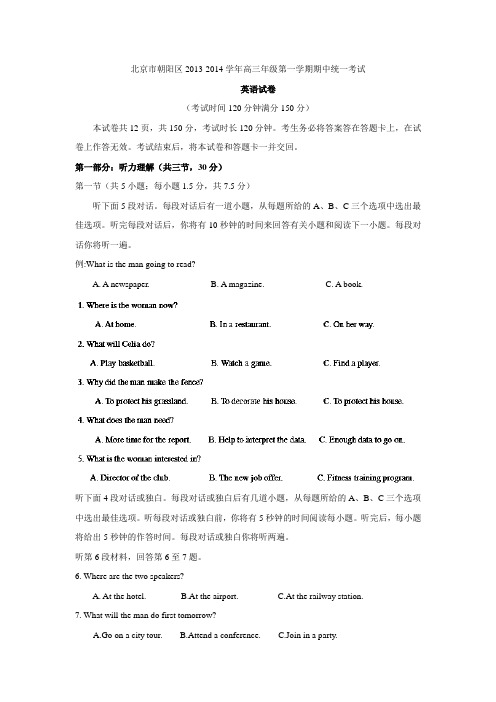
北京市朝阳区2013-2014学年高三年级第一学期期中统一考试英语试卷(考试时间120分钟满分150分)本试卷共12页,共150分,考试时长120分钟。
考生务必将答案答在答题卡上,在试卷上作答无效。
考试结束后,将本试卷和答题卡一并交回。
第一部分:听力理解(共三节,30分)第一节(共5小题;每小题1.5分,共7.5分)听下面5段对话。
每段对话后有一道小题,从每题所给的A、B、C三个选项中选出最佳选项。
听完每段对话后,你将有10秒钟的时间来回答有关小题和阅读下一小题。
每段对话你将听一遍。
例:What is the man going to read?A. A newspaper.B. A magazine.C. A book.听下面4段对话或独白。
每段对话或独白后有几道小题,从每题所给的A、B、C三个选项中选出最佳选项。
听每段对话或独白前,你将有5秒钟的时间阅读每小题。
听完后,每小题将给出5秒钟的作答时间。
每段对话或独白你将听两遍。
听第6段材料,回答第6至7题。
6. Where are the two speakers?A. At the hotel.B.At the airport.C.At the railway station.7. What will the man do first tomorrow?A.Go on a city tour.B.Attend a conference.C.Join in a party.听第7段材料,回答第8至9题。
8. What exercise does the woman recommend?A. Rope skipping.B.Swimming.C.Playing tennis.9. What burns the least fat according to the woman's coach?A. Running.B.Walking.C.Swimming.听第8段材料,回答第10至12题。
2014北京市朝阳区高考英语二模试题(附答案)
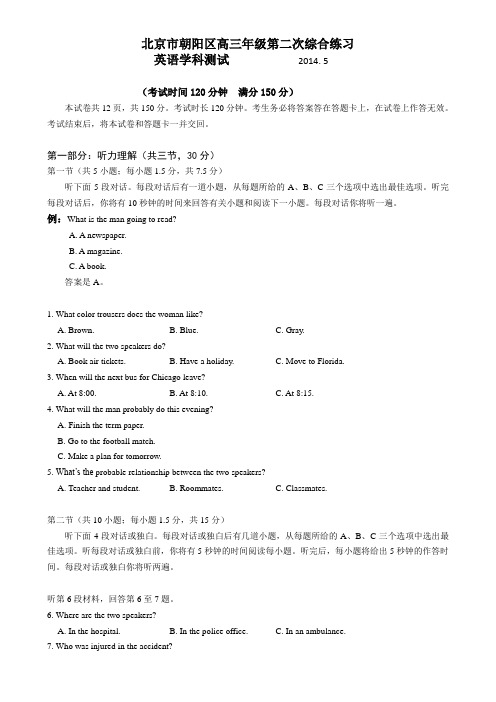
北京市朝阳区高三年级第二次综合练习英语学科测试2014. 5(考试时间120分钟满分150分)本试卷共12页,共150分。
考试时长120分钟。
考生务必将答案答在答题卡上,在试卷上作答无效。
考试结束后,将本试卷和答题卡一并交回。
第一部分:听力理解(共三节,30分)第一节(共5小题;每小题1.5分,共7.5分)听下面5段对话。
每段对话后有一道小题,从每题所给的A、B、C三个选项中选出最佳选项。
听完每段对话后,你将有10秒钟的时间来回答有关小题和阅读下一小题。
每段对话你将听一遍。
例:What is the man going to read?A. A newspaper.B. A magazine.C. A book.答案是A。
1. What color trousers does the woman like?A. Brown.B. Blue.C. Gray.2. What will the two speakers do?A. Book air tickets.B. Have a holiday.C. Move to Florida.3. When will the next bus for Chicago leave?A. At 8:00.B. At 8:10.C. At 8:15.4. What will the man probably do this evening?A. Finish the term paper.B. Go to the football match.C. Make a plan for tomorrow.5. What‟s the probable relationship between the two speakers?A. Teacher and student.B. Roommates.C. Classmates.第二节(共10小题;每小题1.5分,共15分)听下面4段对话或独白。
北京市朝阳区2014届高三上学期期中考试英语试题(含答案)
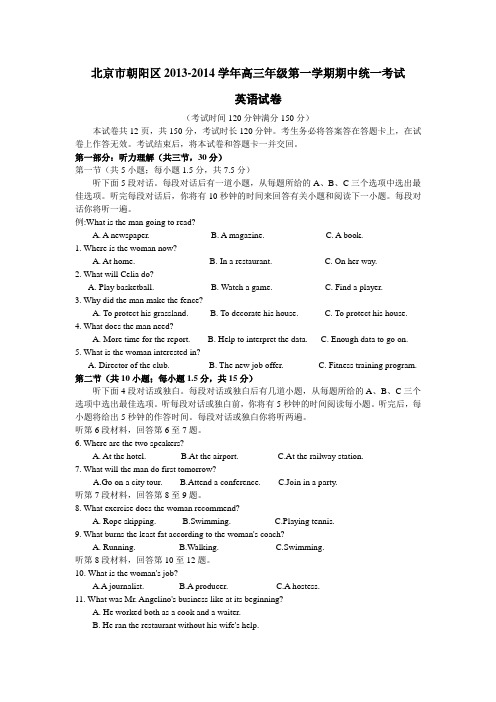
北京市朝阳区2013-2014学年高三年级第一学期期中统一考试英语试卷(考试时间120分钟满分150分)本试卷共12页,共150分,考试时长120分钟。
考生务必将答案答在答题卡上,在试卷上作答无效。
考试结束后,将本试卷和答题卡一并交回。
第一部分:听力理解(共三节,30分)第一节(共5小题;每小题1.5分,共7.5分)听下面5段对话。
每段对话后有一道小题,从每题所给的A、B、C三个选项中选出最佳选项。
听完每段对话后,你将有10秒钟的时间来回答有关小题和阅读下一小题。
每段对话你将听一遍。
例:What is the man going to read?A. A newspaper.B. A magazine.C. A book.1. Where is the woman now?A. At home.B. In a restaurant.C. On her way.2. What will Celia do?A. Play basketball.B. Watch a game.C. Find a player.3. Why did the man make the fence?A. To protect his grassland.B. To decorate his house.C. To protect his house.4. What does the man need?A. More time for the report.B. Help to interpret the data.C. Enough data to go on.5. What is the woman interested in?A. Director of the club.B. The new job offer.C. Fitness training program. 第二节(共10小题;每小题1.5分,共15分)听下面4段对话或独白。
北京市朝阳区2014届高三上学期期中考试 英语试题 含解析
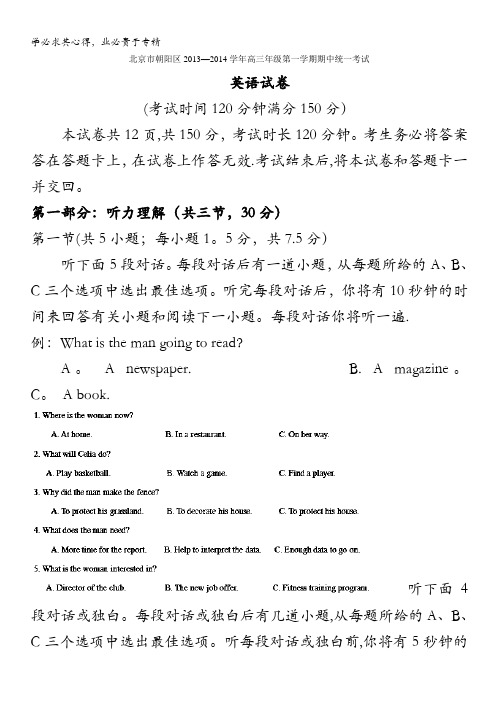
北京市朝阳区2013—2014学年高三年级第一学期期中统一考试英语试卷(考试时间120分钟满分150分)本试卷共12页,共150分,考试时长120分钟。
考生务必将答案答在答题卡上,在试卷上作答无效.考试结束后,将本试卷和答题卡一并交回。
第一部分:听力理解(共三节,30分)第一节(共5小题;每小题1。
5分,共7.5分)听下面5段对话。
每段对话后有一道小题,从每题所给的A、B、C三个选项中选出最佳选项。
听完每段对话后,你将有10秒钟的时间来回答有关小题和阅读下一小题。
每段对话你将听一遍.例:What is the man going to read?A。
A newspaper. B. A magazine。
C。
A book.听下面4段对话或独白。
每段对话或独白后有几道小题,从每题所给的A、B、C三个选项中选出最佳选项。
听每段对话或独白前,你将有5秒钟的时间阅读每小题。
听完后,每小题将给出5秒钟的作答时间。
每段对话或独白你将听两遍。
听第6段材料,回答第6至7题.6. Where are the two speakers?A. At the hotel. B。
At the airport。
C。
At the railway station。
7. What will the man do first tomorrow?A。
Go on a city tour. B.Attend a conference. C。
Join in a party。
听第7段材料,回答第8至9题。
8。
What exercise does the woman recommend?A. Rope skipping.B.Swimming. C。
Playing tennis。
9。
What burns the least fat according to the woman’s coach?A. Running。
B。
Walking. C.Swimming.听第8段材料,回答第10至12题。
北京市朝阳区2014届高三上学期期中考试英语试题Word版含解析

北京市朝阳区2013-2014学年高三年级第一学期期中统一考试英语试卷(考试时间120分钟满分150分)本试卷共12页,共150分,考试时长120分钟。
考生务必将答案答在答题卡上,在试卷上作答无效。
考试结束后,将本试卷和答题卡一并交回。
第一部分:听力理解(共三节,30分)第一节(共5小题;每小题1.5分,共7.5分)听下面5段对话。
每段对话后有一道小题,从每题所给的A、B、C三个选项中选出最佳选项。
听完每段对话后,你将有10秒钟的时间来回答有关小题和阅读下一小题。
每段对话你将听一遍。
例:What is the man going to read?A. A newspaper.B. A magazine.C. A book.听下面4段对话或独白。
每段对话或独白后有几道小题,从每题所给的A、B、C三个选项中选出最佳选项。
听每段对话或独白前,你将有5秒钟的时间阅读每小题。
听完后,每小题将给出5秒钟的作答时间。
每段对话或独白你将听两遍。
听第6段材料,回答第6至7题。
6. Where are the two speakers?A. At the hotel.B.At the airport.C.At the railway station.7. What will the man do first tomorrow?A.Go on a city tour.B.Attend a conference.C.Join in a party.听第7段材料,回答第8至9题。
8. What exercise does the woman recommend?A. Rope skipping.B.Swimming.C.Playing tennis.9. What burns the least fat according to the woman's coach?A. Running.B.Walking.C.Swimming.听第8段材料,回答第10至12题。
- 1、下载文档前请自行甄别文档内容的完整性,平台不提供额外的编辑、内容补充、找答案等附加服务。
- 2、"仅部分预览"的文档,不可在线预览部分如存在完整性等问题,可反馈申请退款(可完整预览的文档不适用该条件!)。
- 3、如文档侵犯您的权益,请联系客服反馈,我们会尽快为您处理(人工客服工作时间:9:00-18:30)。
北京市朝阳区2013—2014学年高三年级第一学期期末练习
英语参考答案2014.1
第一部分:听力理解(共三节,30分)
第一节(共5小题;每小题1.5分,共7.5分)
1—5 BACBC
第二节(共10小题;每小题1.5分,共15分)
6—10 ABACC 11—15 AABCB
第三节(共5小题;每小题1.5分,共7.5分)
每小题1.5分。
如出现拼写错误不计分;出现大小写、单复数错误扣0.5分;如每小题超过一个词不计分。
16.Willa 17.Green 18.86623094 19.flat 20.8/eight
第二部分:知识运用(共两节,45分)
第一节单项填空(共15小题;每小题1分,共15分)
21—25 AABAD 26—30 CCDBD 31—35 BBACD
第二节完形填空(共20小题;每小题1.5分,共30分)
36—40 BDCAC 41—45 BDAAC 46—50 DBCDA 51—55 ACBDB
第三部分:阅读理解(共两节,40分)
第一节(共15小题;每小题2分,共30分)
56—60 AACBD 61—65 ADDBB 66—70 CACDA
第二节(共5小题;每小题2分,共10分)
71—75 CEDGF
第四部分:书面表达(共两节,35分)
第一节(15分)
一、评分原则:
1.本题总分为15分,按4个档次给分。
2.评分时,先根据文章的内容和语言质量初步确定其档次,然后以该档次的要
求来衡量,确定或调整档次,最后给分。
3.评分时应考虑:内容是否完整,条理是否清楚,交际是否得体,语言是否准确。
4.拼写、标点符号或书写影响内容表达时,应视其影响程度予以考虑。
英、美拼写及词汇用法均可接受。
5.词数少于50,从总分中减去1分。
二、各档次的给分范围和要求:
三、One possible version:
Dear Eric,
I’m very happy to hear that I’ll stay with you while I’m in America. Thank you
for being my host.
My name is Li Hua, a boy of eighteen, presently attending Beijing Hongxing Middle School. I’m active and outgoing. I enjoy talking with new people. In my spare time, I like reading English novels and drawing pictures. What’s more, I’m crazy about the NBA and I often play basketball after school with my friends.
Now I’m very excited about visiting America and meeting you because I love to learn and experience new things. I think it’s going to be great!
Looking forward to seeing you!
Best regards,
Li Hua
第二节(20分)
一、评分原则:
1.本题总分为20分,按5个档次给分。
2.评分时,先根据文章的内容和语言质量初步确定其档次,然后以该档次的要求来衡量,确定或调整档次,最后给分。
3.评分时应考虑:内容要点的完整性、上下文的连贯性、词汇和句式的多样性及语言的准确性。
4.拼写、标点符号或书写影响内容表达时,应视其影响程度予以考虑。
英、美拼写及词汇用法均可接受。
5.词数少于60,从总分中减去1分。
三、One possible version:
Sunday, January12 Snowy This morning, when I looked out of the window, I excitedly found it was snowing heavily. Attracted by the beautiful sight, I decided to go out to take some photos. The snow finally stopped at noon, and I couldn’t wait to go outside with my camera. As I walked on the path in front of our building, I saw a boy suddenly slip on the snow-covered ground. It was at that moment that I realized what I should do. Immediately, I ran back home to get a broom and started to sweep the path. I worked so hard that I sweated a lot. An hour later, the thick snow was cleared away. Looking at the clean path, my neighbors all smiled and gave me thumbs up.
I felt very happy that I did something for my neighborhood. 听力原文:
第一节:
第二节:
第三节:。
